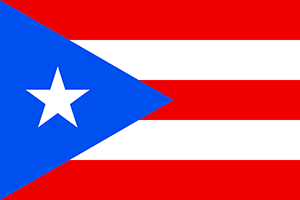Puerto Rico Income Taxes and Tax Forms
 Puerto Rico
Puerto Rico
The Commonwealth of Puerto Rico has its own tax system that uses the United States tax system as a model, but has substantial differences.
Since you cannot prepare and file or e-File a Puerto Rico Tax Return on eFile.com or anywhere online, you can contact the Puerto Rico Department of the Treasury for information on how to do this. However, if you need to complete a federal income tax return, you can do this on eFile.com, but you need to print it, sign it, and mail it to the IRS since the IRS does not accept e-filed returns with Puerto Rico and other U.S. Territory/Protectorate addresses. Find IRS mailing addresses for your federal tax return and see information on filing state tax returns if you need to file one or more state return(s). If you want to know basic Puerto Rico tax information, read on.
Start Federal Tax Return Here
Form 1040-PR and others will be added as they become available; you download the correct form for the correct tax year. See instructions for Bona Fide Residents of Puerto Rico Who Must File 1040 or 1040-SR Income Tax Return.
Filing Puerto Rico & U.S. Tax Returns
Generally, if you are a Puerto Rico bona fide resident, you must file a Puerto Rico tax return. If you are not a bona fide resident of Puerto Rico, you must file both a Puerto Rico tax return and a U.S. tax return. If you are a member of the United States Armed Forces, special tax rules may be applied. For specific information, see this page on foreign earned income, read this guide on taxes for U.S. Citizens and Resident Aliens, and view this publication for individuals with income from U.S. Possessions.
For more details on the filing requirements, see the table below. It is organized by residency status, citizenship, and "Yes" or "No" for filing a U.S. and/or Puerto Rico Tax Return. The easiest way to determine how you should file is by using the free eFile.com FILEucator.
Not bona fide
U.S. Citizen or resident alien
Yes, with worldwide income
Yes, with Puerto Rico income
Not bona fide
Nonresident Alien
Yes, with Puerto Rico income
Bona fide
Nonresident alien
Yes, worldwide income
excluding Puerto Rico income
Yes, worldwide income
excluding U.S. income
Bona fide
U.S. Citizen or resident alien
Yes, worldwide income
excluding Puerto Rico income, or:
No, if only income
is from Puerto Rico
Yes, worldwide income
excluding U.S. income
A Puerto Rico tax return reporting Puerto Rico income and a U.S. tax return is reflected on Form 1040-NR - efileIT. If you are a nonresident alien of the United States, but a bona fide Puerto Rico resident, your tax return will be treated as one of a nonresident alien, meaning you won't be allowed to claim a dependent deduction unless the dependent is a U.S. citizen or national. If you need to add or change any information to your Puerto Rico return after Puerto Rico accepts it, find out how to prepare, file a U.S. Territory Tax Amendment.
Note that if you are a Puerto Rico bona fide resident during the entire year, you are generally not required to file an IRS federal tax return if your only income is from Puerto Rico. Find out if you need to file a U.S. tax return. On your U.S. tax return, you will not be able to claim any tax credits or tax deductions that are either directly or indirectly linked to the excluded income.
If you have self-employment income, you may have to report your information on Form 1040-SS or 1040-PR.
You can prepare your U.S. Tax Return online by clicking the button below:
Puerto Rico Sales Tax
Since Puerto Rico is a commonwealth and an unincorporated territory of the United States, it has a 10.5% sales and use tax rate. Municipal governments also levy a 1% municipal sales and use tax.
The U.S. commonwealth generally has two sales tax holidays per year. The first one is held in January and applies to the purchase of school supplies and uniforms. The second one is held in July and applies to school uniforms, supplies, textbooks, and notebooks.
See other U.S. States, Territories, and Protectorates.
TurboTax® is a registered trademark of Intuit, Inc.
H&R Block® is a registered trademark of HRB Innovations, Inc.